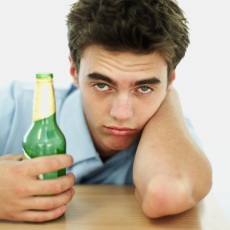Preventing Impaired Driving in Your Teen
Alcohol isn't just illegal for teenagers to consume—it can be deadly if they drink and drive. In fact, drunk driving is one of the most frequent causes of death among teens. Alcohol impairs most of the skills that young drivers need the most, such as their reaction time, their vision, and their judgment.

What can a parent do? Being proactive can reduce the risk of underage drinking and teen drunk driving. Use the strategies below to keep your teen safe on the road.
Set rules and explain the consequences of breaking them
Explain to your teenagers that they are not to drink alcohol at all, especially if they plan to drive. Make sure that they know it is illegal for anyone under the age of 21 to drive with any trace of alcohol in his or her body. Lay out the possible consequences of being caught driving drunk, including serving time in jail, losing his or her driver's license, being denied acceptance to college or worst of all, being involved in a fatal car crash. Communicate rules and expectations clearly. You may consider developing a parent-teen driving agreement to set and enforce these rules and expectations.
Equip teens to handle peer pressure
Some teenage drinking is due to pressure from friends. Sit down with your teens and talk about scenarios they might encounter that involve alcohol. Remember that most teens who drink, do so to get drunk. Discuss what they would do if they were offered a beer at a party and how to turn down a ride from a friend who has been drinking. Remind them that they can always call you for a ride if they end up in a situation in which alcohol is being served to teens.
Practice what you preach
Set a good example for responsible adult alcohol use in your own home. Don't drink excessively, and discourage drunkenness by adult guests. Avoid making jokes about drinking, too—this will dispel the notion that alcohol use is funny, or glamorous. Refrain from implying that alcohol is a good way to solve problems—avoid making comments like "It's been a tough day—I need a drink."
Get to know their friends
Help your kids build friendships with other teens who do not drink. Communicate with your teenagers friends and their parents as well. If you notice your teenager hanging out with a friend who is known to use alcohol, limit their time together by making strict rules on how afterschool time can be spent and how late he or she can stay out at night.
Know your state laws
Despite parents' best efforts, some teenagers drive drunk anyway, and many are charged with DUI. If this happens to your child, educate yourself on the legal consequences he or she could face. These could include suspension of his or her license, attendance at an alcohol awareness class, community service, a fine, and possible jail time. If you feel your child's DUI may be the result of a serious alcohol abuse problem, talk with your family doctor. A referral to a psychiatrist or mental health counselor may be necessary to treat the problem.
To learn more, visit the website of the National Highway Traffic Safety Administration. You'll find additional ideas for educating your teen about driving safety and the deadly combination of drinking and getting behind the wheel of a car.
Connect with us:
Download our App: